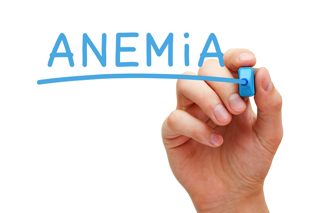
When people are working to manage an autoimmune or chronic condition, they typically focus on an anti-inflammatory diet and protocol. However, one often overlooked dealbreaker to getting better is anemia. Anemia as is a deal breaker to recovery because it means your cells are not getting enough oxygen. Without oxygen, recovery and repair can’t happen.
Anemia typically causes fatigue, weakness, brain fog, depression, lightheadedness, dizziness, irregular heart beat, cold hands and feet, chest pain, headache, and pale skin.
There are several different causes and types of anemia. Not all anemia is iron-deficiency anemia. It’s important to know this because you don’t want to supplement with iron if you don’t need it. In excess, iron is more toxic than mercury, lead, or other heavy metals.
Types of anemia
Iron-deficiency anemia. This is the most common form of anemia and is caused by insufficient iron. What is less well known is that gluten intolerance and celiac disease can cause iron deficiency anemia. This is because these conditions damage the gut so that it can’t absorb iron. It is also caused by internal bleeding, such as from ulcers. This shows up on a blood test as low iron and low ferritin.
B-12 anemia. Like it sounds, this is caused by insufficient B-12. This could be due to a diet low in B-12. You can screen for B-12 deficiency with a urinary methylmalonic acid and serum homocysteine test.
Pernicious anemia. Pernicious anemia is an autoimmune disease in which the immune system attacks a compound in the stomach called intrinsic factor, which is necessary to absorb B-12. Many people with autoimmune diseases such as Hashimoto’s also have pernicious anemia. This appears as B-12 anemia. Screening for intrinsic factor and parietal cell antibodies can identify pernicious anemia.
Anemia of inflammation or chronic disease. This type of anemia results from the breakdown of red blood cells. You may have symptoms of anemia but serum levels are normal. However, serum ferritin levels are typically high, indicating iron is not being used correctly by the body. Sources of inflammation that can cause this type of anemia are disease, toxicity, infections, gut damage, over training, and more. It’s important to rule this out because taking iron with this kind of anemia can exacerbate the inflammation.
Other types of less common types of anemia include aplastic anemia, anemia associated with bone marrow disease, hemolytic anemia, and sickle cell anemia.
Too much iron in the bloodstream
On the other end of the spectrum from anemia, some people have a genetic disorder that leads them to absorb too much iron. It’s a relatively common condition, affecting about one million people in the United States. Symptoms include joint pain, chronic fatigue, heart flutters, and abdominal pain. If left untreated, it can increase the risk of diabetes, arthritis, liver inflammation (cirrhosis), sexual dysfunction, and other diseases.
Hemochromatosis is managed through regular blood draws and a diet that minimizes iron intake.
Ask my office about getting tested if you have symptoms of anemia.





Latest from the Blog
Breaking Through Cancer Barriers: News Outlets Spotlight High-Dose Vitamin C Therapy
December 5, 2024https://www.yahoo.com/news/pancreatic-cancer-patient-survival-doubled-152722177.html Harnessing the Power of High-Dose Vitamin C in Cancer Treatment Recent advances in cancer treatment research have brought renewed attention to high-dose intravenous (IV) vitamin C, particularly in extending survival rates for patients with advanced different forms of cancer. A groundbreaking phase 2 clinical trial Study Finds demonstrated that combining high-dose IV vitamin C […] Read more
Latest from the Blog
The Dirty Dozen
The “Dirty Dozen” is a list of fruits and vegetables, compiled by the Environmental Working Group (EWG), that you should always eat organically. These produce items are not only delicious and nutrient-rich but also tend to carry high levels of pesticide residues when grown conventionally. By opting for organic versions, you can significantly reduce your […] Read more